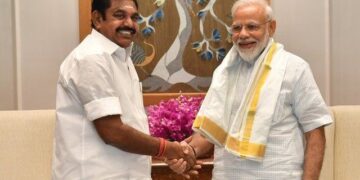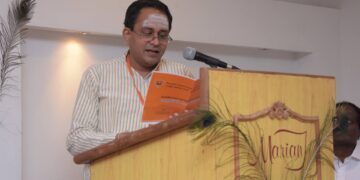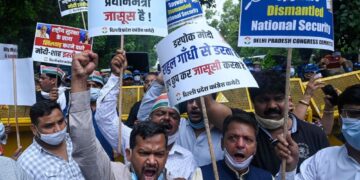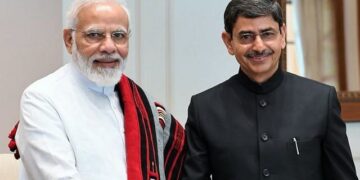பல்கலைக் கழகங்களில் மாணவர்கள் ஒன்று கூடுவதற்கும், அரசியல் விவாதங்களை நடத்துவதற்கும், ஆர்ப்பாட்டங்கள் நடத்துவதற்கும் தடைவிதிக்கப்பட்டது.போராடிய முன்னணி மாணவர்கள் சிறைப்பிடிக்கப்பட்டனர். சீர்த்திருத்த முகாம்களிலும், சிறைகளிலும் அவர்கள் அடைக்கப்பட்டனர். ஊடகங்களும், அரச ஆதரவாளர்களும் மாணவர்கள் சமூகத்தைச் சீர்குலைப்பதாகக் பிரச்சாரங்களை மேற்கொண்டன. இவையெல்லாம் நடந்தது இலங்கையின் வடக்கிலோ கிழக்கிலோ அல்ல. இன்று ஜேர்மனியில் அகதிகளாக தஞ்சம் கோரிய மக்கள் மட்டுமல்ல ஜேர்மனியர்கள் கூட அனுபவிக்கும் ஜனநாயக உரிமைகளை வென்றெடுத்த பல்கலைக்கழக மாணவர்களின் போராட்டத்தை ஒடுக்குவதற்காகவே அரசு அவ்வாறு செயற்பட்டது. இன்றைய ஜேர்மனிய மக்களது சிந்தனையைத் தீர்மானிக்கும் போராட்டத்தை 60களில் நடத்திய பல்கலைக்கழக மாணவர்களின் போராட்டம் இலங்கையின் புறச்சூழலோடு பொருத்திப்பார்க்கத் தக்கது.
ஹிட்லரின் வீழ்ச்சிக்குப் பின்னரும் ஜேர்மனிய சமூகம் மிக நீண்ட காலத்திற்கு நாசி சிந்தனைக் கூறுகளைக் கொண்டதாகக் காணப்பட்டது. உலகின் ஏனைய மக்களுக்கு எதிராகவும் யூதர்களுக்கு எதிர்கவும் சமூகத்தின் கணிசமான பகுதி நாசிக் கருத்துக்களால் ஆட்கொள்ளப்பட்டிருந்தது. அதேவேளை அமரிக்க ஆக்கிரமிப்பு இராணுவம் ஜேர்மனியில் நிலைகொண்டிருந்தது.
 1960 கள் வரை தொடர்ந்த இந்த நிலைமைக்கு ஜேர்மனியின் இரண்டாம் உலகப் போருக்குப் பிந்திய நிலைமையும் ஒரு காரணமாக இருந்தது. உணவுப் பஞ்சமும் பட்டினிச் சாவுகளும் அதிகரித்திருந்ததன.
1960 கள் வரை தொடர்ந்த இந்த நிலைமைக்கு ஜேர்மனியின் இரண்டாம் உலகப் போருக்குப் பிந்திய நிலைமையும் ஒரு காரணமாக இருந்தது. உணவுப் பஞ்சமும் பட்டினிச் சாவுகளும் அதிகரித்திருந்ததன.
உலகப்போருக்குப் பின்னர் உற்பத்தியத் தொடங்குவதற்கு ஜேர்மனியில் மூலதனப் பற்றாக்குறை நிலவியது. இந்த நிலையில் 1950 களில் ஆரம்பித்து ஜேர்மனியில் புதிய பொருளாதாரக் கொள்கை அறிமுகப்படுத்தப்பட்டது. புதிய பொருளாதாரக் கொள்கையின் கீழ் புதிய பணமான டச் மார்க் அறிமுகப்படுத்தப்பட்டது. மக்கள் மீதான பொருளாதாரச் சுமைகளை இந்தக் கொள்கை மேலும் அதிகப்படுத்தியது. சிக்கனம் என்ற பெயரில் அரச செலவீனங்கள் கட்டுப்படுத்தப்பட்டன. கல்வி மட்டுப்படுத்தப்பட்டது. பல்கலைக் கழகங்களில் வரையறுக்கப்பட்ட நேரம் மட்டுமே கல்வி கற்கலாம் என்ற நிலை ஏற்பட்டது.
இவற்றை எல்லாம் ஜேர்மனிய அரசும் புதிய அதிகார வர்க்கமும் மிக இலகுவாகவே நிறைவேற்ற முடிந்தது. மக்களின் எதிர்ப்புக் குரல்களோ போராட்டங்களோ எழவில்லை. ஹிட்லரின் நாசி ஆட்சிக் காலத்தில் வெகுஜன அமைப்புக்கள் அழிக்கப்பட்டு ஜேர்மனியர்கள் மேலானவர்கள் ஆரிய இனத்தைச் சார்ந்தவர்கள் என்ற கருத்து விதைக்கப்பட்டு மக்களின் ஏகோபித்த ஆதரவை ஹிட்லர் ஆட்சி பெற்றுக்கொண்டது. யூதர்களையும் ஆரியர்கள் இல்லாதவர்கள் என்று அவர்கள் கருதுவோரையும் அழிப்பதற்காக ஹிட்லரின் ஆட்சி இராணுவப் படையை உருவாக்கியது. இளைஞர்கள் இராணுவத்தில் இணைந்து கொண்டனர். இடதுசாரிகளும், மக்கள் அமைப்புக்களும், ஜனநாயக நிறுனங்களும் அழிக்கப்பட்டன.
இரண்டாம் உலக யுத்ததின் பின்னர், ஹிட்லரின் அழிவிற்குப் பின்னான காலப்பகுதியில் உருவான அரசு கொடுமையான அரசியல் சட்டங்களை இயற்றும் போதும் மக்கள் மீது பொருளாதார ஒடுக்குமுறையைப் பயன்படுத்திய போதும் அங்கு போராடுவதற்கு யாரும் இல்லை. மக்கள் அமைப்புக்கள் அழிக்கப்பட்டிருந்ததால் ஒன்று கூடுவதற்குரிய எந்த ஜனநாயக அமைப்பு முறைகளும் இருக்கவில்லை. இதனால் புதிய அரச பாசிசம் மக்களைக் கோரமாகச் சுரண்ட ஆரம்பித்தது. எதிர்ப்புக் குரல் கொடுத்தவர்கள் முளையிலேயே கிள்ளியெறியப்பட்டார்கள்.
இந்த நிலையில் பல்கலைக்கழக மாணவர்கள் மட்டுமே ஒன்றிணையும் வலுவைக் கொண்டிருந்தனர். அவர்கள் சிறிது சிறிதாகக் கொடுங்கோல் ஆட்சிக்கு எதிராகக் குரல் கொடுக்க ஆரம்பித்தனர்.
இன்று குறைந்த பட்ச மனிதாபிமானமும் சகிப்புத்தன்மையும் உடைய சமூகமாக ஜேர்மனியை மாற்றிய மாணவர்களின் போராட்டம் 60களின் நடுப்பகுதியிலேயே ஆரம்பித்தது.
1966 ஆம் ஆண்டு ஜேர்மனியின் அதிபராகவிருந்த ஜோர்ஜ் கேசிங்கர் ஹிட்லரின் ஆதரவாளர். மக்கள் மத்தியிலிருந்து எதிர்ப்புக்கள் எழாதவாறு ஒடுக்குமுறை தலைவிரித்தாடியது. இந்த நிலையில் அமரிக்க இராணுவம் வியட்னாமில் ஆக்கிரமிப்புப் போரை நடத்திக்கொண்டிருந்தது. ஜேர்மனிய அரசு அந்தப் போருக்கு வெளிப்படையாக ஆதரவு வழங்கியது. முதலில் பல்கலைக்கழக மாணவர்கள் அமரிக்க அரசின் வியட்நாமிய ஆக்கிரமிப்புக்கு எதிராக ஆங்காங்கு போராட்டங்களை நடத்தினர்.
அவர்களது ஆர்ப்பாட்டங்களின் போது மூன்றாம் உலக நாடுகளின் மக்களைச் சுரண்டுவதற்கு எதிரான சுலோகங்கள் முன்வைக்கப்பட்டன. பல சிறிய வெளியீடுகளை மாணவர்கள் வெளியிட்டார்கள். மூன்றாம் உலக நாடுகள் மீதான காலனிய, நவ-காலனிய ஆக்கிரமிப்பை மாணவர்கள் எதிர்க்க ஆரம்பித்தனர்.
 ஹிட்லரின் நாசிசக் கொள்கைகளுக்கு ஆதரவளித்த தமது பெற்றோரின் சிந்தனையை மாற்ற வேண்டும் என்று மாணவர்கள் மத்தியில் குழுக்கள் உருவாகின.
ஹிட்லரின் நாசிசக் கொள்கைகளுக்கு ஆதரவளித்த தமது பெற்றோரின் சிந்தனையை மாற்ற வேண்டும் என்று மாணவர்கள் மத்தியில் குழுக்கள் உருவாகின.
ஜேர்மனி முழுவதிலும் பல்கலைக்கழகங்களில் அரசியல் விவாதங்களும் வெளியீடுகளும், ஒழுங்கமைக்கப்பட்ட மாணவர் அமைப்புக்களும் உருவாகின. இவை அனைத்துமே மார்க்சிய தத்துவத்தை ஏற்றுக்கொண்ட குழுக்களாக போராட வேண்டும் என்ற அடிப்படையில் தோற்றம் பெற்றன.
வெகுஜன அமைப்புக்களும் ஏனைய கட்சிகளும் அழித்துத் துடைக்கப்பட்டிருந்த நிலையில் மாணவர்களே சமூக மாற்றத்திற்கான தலைமையை ஏற்றுக்கொள்ளும் நிலை உருவானது.மாணவர்களைப் பொறுதவரைக்கும் மிகவும் கடினமான முழக்கங்களை முன்வைத்தனர். சமூகத்தின் ஏனைய பகுதிகளின் எதிர்ப்புக்கு மத்தியில் பின்வரும் முழக்கங்களை அவர்கள் முன்வைத்தனர்.
1. ஊடக சுதந்திரத்திற்காகப் போராடுதல் குறிப்பாக ஜேர்மனில் தனி ஆதிக்கம் செலுத்திய அலெக்ஸ் ஸ்ப்ரிங்கர் நிறுவனத்தின் பாசிசக் கருத்துக்களைக் கொண்ட ஊடகங்களுக்கு எதிராகப் போராடுதல்.
2. அப்பொழுது மாணவர் போராட்டங்களுக்கு எதிராக ஜேர்மனிய அரசு நிறைவேற்றவிருந்த அவசரகால சட்டத்தை நிறுத்தல்.
3. வியட்னாமில் அமரிக்காவின் ஆக்கிரமிப்புக்கு எதிராகப் போராடுதல்.
4. மாணவர் கல்வியை மறு சீரமைத்தல்
5. பெண்களின் உரிமைக்காகப் போராடுதல்.
6. இன்னும் நாசிச சிந்தனையால் ஆட்கொள்ளப்பட்டிருந்த தமது பெற்றோர்களை மாற்றுதல்.
7. தொழிற்சங்கங்களையும் வெகுஜன அமைப்புக்களையும் உருவாக்கும் உரிமைக்காவும் ஒன்று கூடும் உரிமைக்காகவும் போராடுதல்.
மாணவர்கள், ஹிட்லரின் பாசிச அரசியல் இன்னும் நிறைவு பெறவில்லை என்பதையும் அது புதிய வடிவத்தில் மக்களை அழிக்கிறது என்பதையும் உறுதியாக முன்வைத்தனர்.
இந்த நிலையில் ஜேர்மனிய அரசு அறிமுகப்படுத்திய பாசிசப் பொருளாதாரக் கொள்கை கல்வியிலும் கைவைத்தது. விரைவாக பட்டப்படிப்பை முடித்து வேலையில் இணைந்து கொள்ள வேண்டும் என்று மாணவர்களை நிர்ப்பந்திதது.
அதற்காகவே, பாட நெறிகளைக்கான காலத்தைக் குறைத்தது. மாணவர்களின் எண்ணிகையை மட்டுப்படுத்தியது. 1966 வசந்தகால விடுமுறையின் போது பேர்லின் பல்கலைக்கழகத்தில் இந்தச் சட்டம் அமுலுக்கு வந்தது. மாணவர்கள் விடுமுறையில் சென்றிருந்த காரணத்தால் அரசாங்கம் போராட்டங்களோ எதிர்ப்புக்களோ தோன்றாது என கணக்குப் போட்டிருந்தது. ஆனால் அரசு எதிர்பார்க்காமலேயே ஐந்தாயிரம் வரையிலான மாணவர்கள் தெருவில் இறங்கி தொடர்ச்சியான ஆர்பாட்டத்தை ஆரம்பித்தனர். மாணவர்களின் இந்த ஆர்ப்பாட்டம் ஜேர்மனி முழுவதும் பரவ ஆரம்பித்தது. ஹம்பேர்க் உயர்கல்வி நிலையம் அடுத்ததாக பெரும் போராட்டத்தை ஆரம்பிக்க ஏனைய பல்கலைக் கழகங்களும் போராட்டத்தில் இணைந்து கொண்டன.
இந்தப் போராட்டங்களின் பின்னர் ஜேர்மனிய அரசு பல்கலைக்கழக நிர்வாகிகளுக்கு மாணவர்களின் அரசியல் உரையாடல்களையும், பலர் ஒரே இடத்தில் ஒன்று கூடுவதையும் தடுக்குமாறு உத்தரவிட்டது. அதே வேளை அவசரகால சட்டம் என்ற புதிய அடக்குமுறைச் சட்டத்தையும் ஜேர்மனிய அரசு முன்மொழிந்தது. அதற்கான வாக்கெடுப்பிற்காக பாராளுமன்றத்திற்கு வெளியிலும் ஊடகங்கள் வாயிலாகப் பிரச்சாரம் மேற்கொண்டது.
அதற்கு எதிரான மாணவர் போராட்டங்கள் ஒழுங்குபடுத்தப்ப்பட அளவில் ஜேர்மனி முழுவதிலும் நடைபெற்றது..
சோசலிச ஜேர்மனிய மாணவர் ஒன்றியம் என்ற அமைப்பு ஜேர்மனியில் அனைத்துப் பல்கலைக்கழகங்களையும் இணைத்தை அமைப்பாக பலம் பெற்றது.
ஈரானிய மன்னர் ஷா உடன் ஜேர்மனிய அரசு நெருக்கமான உறவைப் பேணிவந்தது. அமரிக்க அரசைப் போன்றே ஷாவின் சர்வாதிகாரத்திற்கு ஐரோப்பிய அரசுகளும் தூண்களாக அமைந்தன. 1967 ஆம் ஆண்டு ஜூன் மாதம் 2ம் திகதி ஷா ஜேர்மனிக்கு அரச விருந்தினராக வந்திருந்த போது மாணவர்கள் பெருந்திரளாக எதிர்ப்புப் போராட்டங்களை நடத்தினார்கள். ஒபேரா ஹவுஸ் இற்கு முன்னால் மாணவர்கள் நடத்திய ஆர்ப்பாட்டத்தில் ஜேர்மனிய போலிஸ் படைகளால் ஒரு மாணவர் சுட்டுக்கொல்லபட்டார்.
அரச பயங்கரவாதம் நிகழ்த்திய இந்தப் படுகொலைக்கு எதிராக முழு ஜேர்மனிய தேசமக்களும் மாணவர்களோடு இணைந்து போராட ஆரம்பித்தனர். கொலை நிகழ்ந்த மறு நாளிலிருந்து மக்கள் எழுச்சிகள் ஜேர்மன் தேசம் முழுவதிலும் தோற்றம்பெற்றது.
ஜேர்மனிய அரசாங்கம் பேர்லின் உள்ளிட்ட பல நகரங்களில் போராட்டங்களுக்குத் தடை விதித்தது. பல மாணவர்கள் கைது செய்யப்பட்டு சிறைப்பிடிக்கப்பட்டனர். சீர்திருத்த முகாம்களிலும் அரச சிறைக்கூடங்களிலும் முன்னணி மாணவர்கள் சிறைவைக்கப்பட்டனர்.
இவ்வேளையில் ஊடகங்கள் அரச ஆதரவுப் பிரச்சாரங்களை முடுக்கிவிட்டன. மாணவர்கள் சமூகவிரோதிகள் என்றும் கம்யூனிசம் நாட்டை மீண்டும் அழிக்க முனைகிறது என்றும் திட்டமிட்ட பிரச்சாரங்களை மேற்கொண்டன. மாணவர்களின் ஆர்ப்பாட்டங்களில் மக்கள் பெருமளவில் பங்கேற்றனர். கொடுமையான ஒடுக்குமுறைக்கு மத்தியில் பொன் நகரில் நடைபெற்ற ஆர்ப்பாட்டத்தில் 80 ஆயிரம் பொதுமக்கள் கலந்துகொண்டனர்.
 இவ்வேளையில் ஜேர்மனிய சோசலிச மாணவர் ஒன்றியத்தின் முக்கிய தலைவர்களில் ஒருவரான ரூடி டொற்சேக் என்பவர் மீதான படுகொலை நிகழ்வு ஒன்று நடைபெறுகிறது. தலையில் ஒரு துப்பாக்கிக் குண்டு துளைத்த நிலையில் அவர் உயிர் தப்பிக்கிறார். அதன் பின்னதாக் 12 ஆண்டுகள் உயிர்வாழ்ந்து சமூகப் போராளியாகவே மரணித்துப் போனார்.அவரை ஜேர்மனிய அரசு மன நோயாளி என்றும் சமூகத்தின் பயங்கரமான எதிரி என்றும் ஏற்கனவே மக்கள் மத்தியில் கதைகளை உலாவவிட்டிருந்தது. ஊடகங்கள் அதற்குத் துணை போயின.
இவ்வேளையில் ஜேர்மனிய சோசலிச மாணவர் ஒன்றியத்தின் முக்கிய தலைவர்களில் ஒருவரான ரூடி டொற்சேக் என்பவர் மீதான படுகொலை நிகழ்வு ஒன்று நடைபெறுகிறது. தலையில் ஒரு துப்பாக்கிக் குண்டு துளைத்த நிலையில் அவர் உயிர் தப்பிக்கிறார். அதன் பின்னதாக் 12 ஆண்டுகள் உயிர்வாழ்ந்து சமூகப் போராளியாகவே மரணித்துப் போனார்.அவரை ஜேர்மனிய அரசு மன நோயாளி என்றும் சமூகத்தின் பயங்கரமான எதிரி என்றும் ஏற்கனவே மக்கள் மத்தியில் கதைகளை உலாவவிட்டிருந்தது. ஊடகங்கள் அதற்குத் துணை போயின.
பெரும்பான்மை மக்களின் எதிர்ப்பைப்பெற்ற இந்தப் படுகொலையின் பின்னர் பொன் நகரில் நடைபெற்ற ஆர்ப்பாட்டத்தில் புதிதாக உருவான தொழிற்சங்கங்களும் இணைந்து பல்லாயிரக்கணக்கான மக்கள் கலந்துகொண்டனர்.
அன்று மாணவர்கள் உறுதியான கட்சியின் வழி நடத்தல் இருந்திருக்கவில்லை.
மாணவர்களின் மக்கள் சார்ந்த உறுதி மிக்க போராட்டங்கள் ஊடாக, மக்களின் சிந்தனை மாற்றமடைந்ததை உணர்ந்துகொண்ட அரசு பல புதிய சீர்திருத்தங்களை அறிவித்தது. சமூகநல அரசு உருவானது. தொழில் நிறுவனங்கள் பலவற்றிற்கு வரி விதிக்கப்பட்டு மக்கள் நலத் திட்டங்களுக்காகப் பயன்படுத்தப்படும் என அரசு அறிவித்தது.அரசியல் அகதிகளுக்கு உதவிகள் வழங்குவதற்கான திட்டத்தை அரசு முன்வைத்தது. கம்யூனிசப் புரட்சிக்குப் பயந்தத அரசு அறிவித்த சமூக நலத் திட்டங்கள் மாணவர் இயக்கத்தில் பிளவுகளை ஏற்படுத்திற்று.
அரசியல் தலைமையின் வழிநடத்தல் இன்மையால் சிதைந்துபோன மாணவர் இயக்கத்தின் கூறுகள் இன்னும் உயிர்ப்புடன் இருப்பதைக் காணலாம். நவம்பர் மாதம் ஜேர்மனியில் நடைபெற்ர இந்திய மக்கள் போராட்டத்திற்கு ஆதரவான மாநாட்டில் பல ஜேர்மனிய மாணவர்கள் கலந்துகொண்டனர்.
அறுபதுகளில் ஜேர்மனிய மக்களின் சிந்தனையில் மாற்றத்தைத் தோற்றுவித்த மாணவர்களின் தியாகங்களே இலங்கையிலிருந்து புலம் பெயர்ந்த தமிழர்கள் ஜேர்மனியில் அகதிகளுக்கன வசதிகளைப் பெற்று வாழ்வதற்கான அடிப்படைக் காரணமாகும். மக்கள் மத்தியில் மாணவர்கள் ஏற்படுத்திய சிந்தனை மாற்றம் இறுகிய ஜேர்மனிய பாசிசத்தில் உடைவுகளை ஏற்படுத்தி குறைந்தபட்ச முதலாளித்துவ ஜனநாயகத்தை மீட்டெடுத்தது.
ஜேர்மனிய மாணவர் எழுச்சிகளிலிருந்து யாழ்ப்பாணப் பல்கலைக் கழகத்தில் போராடும் மாணவர்கள் எதனைக் கற்றுக்கொள்ளலாம் என்பது இன்றைய சூழலில் மிக முக்கியமானது.
இலங்கை போன்ற முதலாளித்துவ ஜனநாயகம் கூட வேரோடு பிடுங்கப்பட்ட நாட்டில் ஜனநாயகத்தை மீட்பதில் பல்கலைக்கழக மாணவர்களின் பங்கு தீர்மானகரமானது.
1980 களின் பின்னர், சரி தவறு என்ற விவாதங்களுக்கு அப்பால் யாழ். பல்கலைக்கழக மாணவர்களின் போராட்டப் பாரம்பரியம், அவர்கள் சமூகத்தின் மீது செலுத்திய ஆளுமை போன்றன ஆய்வுக்கு உட்படுத்தப்பட வேண்டியவை.
ஜேர்மனிய மாணவர் போராட்டதின் படிப்பினைகளிலிருந்து யாழ்ப்பாணப் பல்கலைக்கழகத்தின் போராட்ட பாரம்பரியம் குறித்த கற்றலுக்கு ஊடாக இன்றைய போராட்டங்கள் வெற்றி பெறுவதற்கான முன்நிபந்தனைகளை ஆராய்வதெ இந்தக் கட்டுரையின் இறுதி நோக்கம்.
இன்னும் வரும்…











போராட்டம் செய்யலாம் ஆனால் புலி ஆதரவு போராட்டம் செய்தால் இவர்களுக்கு மணடை லூசு என்று அர்த்தம்
Are you a clinical psychologist or you yourself seeking the help of a shrink?
What is a shrink?
இதேமாதிரி அந்தந்த நாடுகளில் நடந்த போராட்ட தியாகங்களில்தான் நாம் சுகபோகம் காணுகிறோம்…
Man has given up his family to bring our strugle to international level.People like us are secured our life in foreign countries and talking rubbish about Tigers and group.Rather,if we can stop accusing Tigers and do some productive work to achieve some solutions to Tamils that would be appreciated.Without Tigers we wouldn’t be talking about this today.
Skantha, this is like the speech the Abe Lincoln made at Gettyburgh. What is scrifice for us is now damage control for them. Dr. T. Jayasingham (tjayasingham@gmail.com) said that America became a better country after the war.
இன்றை சூழ்நிலையில் இது ஒரு தேவையற்றவேலை 3000 மாணவர்கள் கல்வி கற்கும் ஒரு இடத்தில் 100 மாணவர்கள் போராட்டம் நடத்தினால் ஏனைய மாணவர்களின் கல்வி பாதிக்கப்படத்தான் செய்யும் முன்பு பல்கலைக்கழகத்திற்கு பிள்ளை தொpவானால் ஊரில் பெரிய விழா எடுப்பார்கள் ஆனால் இன்று பல்கலைக்கழகத்திற்கு போய் என்ன படிக்கவாபோகுது என்று கேள்வி கேட்கும் அளவிற்கு நிலமை மாறிவிட்டது. என்ன தேவைக்காக இங்கு வருகின்றோம் என்று மறந்து செயற்படுவதால் வரும் வினைதான் இது. எமக்காக யாரும் வரமாட்டார்கள் என்பதே உண்மை கைது செய்யப்பட்ட மாணவர்களின் நிலை இதற்கு நல்ல ஊதாரணம்
ஆகா அற்புதமான பதிவு. அதற்கேற்றால்போல் வைத்தியரும் வந்து தமது கடமையை செய்கின்றார்.
யாழ் பல்கலைக்கழக மாணவா்கள் தங்கள் நிலைப்பை உறுதிப்படுத்த போராடுகின்றார்கள் அது அவா்களின் உரிமை,இதில் சரியோ தவறோ சொல்வதற்கு எந்தப் பரதேசிக்கும் உரிமைகிடையாது, குறிப்பாக பேரினவாத தரகா்களுக்கு கிடையவே கிடையாது. மனிதன் பூமியில் நிலைக்கும்வரை தன் உரிமைக்காக போராடியே ஆகவேண்டும்.தேவையேற்பட்டால் மறுபடியும் ஆயுதம் தூக்கவும் வேண்டும்.
Kumar, the students should concentrate on their studies and nothing else as nothing will happen by any of their other actions. UOJ was created to clear Colombo and Peradeniya campuses of the people who were feeling uneasy because of the political developments in the North and East.
what is the purpose of education ? is it just to get a diploma and get a white color job?
Mouleesan, Chinese Proverb. If you are planning for 100 years then educate teh peolple.
Sri, if only the Egyptians did what you say Mubarak would have been in power still and the same is true for Libya, Tunusia etc. etc. You are insulting the human spirit. No disrespect meant to you personally.
Mustang, this is 1989. Arab Spring. They are retiring the United States Ship Enterprise after 51 years. Another American Century.
Chomsky defines his view of education in an Enlightenment sense, in which the “highest goal in life is to inquire and create. The purpose of education from that point of view is just to help people to learn on their own. It’s you the learner who is going to achieve in the course of education and it’s really up to you to determine how you’re going to master and use it.” An essential part of this kind of education is fostering the impulse to challenge authority, think critically, and create alternatives to well-worn models. This is the pedagogy I ended up adopting, and as a college instructor in the humanities, it’s one I rarely have to justify.
Chomsky defines the opposing concept of education as indoctrination http://www.openculture.com/2012/11/noam_chomsky_spells_out_the_purpose_of_education.html
//பல்கலைக் கழகங்களில் மாணவர்கள் ஒன்று கூடுவதற்கும், அரசியல் விவாதங்களை நடத்துவதற்கும், ஆர்ப்பாட்டங்கள் நடத்துவதற்கும் தடைவிதிக்கப்பட்டது.போராடிய முன்னணி மாணவர்கள் சிறைப்பிடிக்கப்பட்டனர். சீர்த்திருத்த முகாம்களிலும், சிறைகளிலும் அவர்கள் அடைக்கப்பட்டனர். ஊடகங்களும், அரச ஆதரவாளர்களும் மாணவர்கள் சமூகத்தைச் சீர்குலைப்பதாகக் பிரச்சாரங்களை மேற்கொண்டன. இவையெல்லாம் நடந்தது இலங்கையின் வடக்கிலோ கிழக்கிலோ அல்ல. இன்று ஜேர்மனியில் அகதிகளாக தஞ்சம் கோரிய மக்கள் மட்டுமல்ல ஜேர்மனியர்கள் கூட அனுபவிக்கும் ஜனநாயக உரிமைகளை வென்றெடுத்த பல்கலைக்கழக மாணவர்களின் போராட்டத்தை ஒடுக்குவதற்காகவே அரசு அவ்வாறு செயற்பட்டது. இன்றைய ஜேர்மனிய மக்களது சிந்தனையைத் தீர்மானிக்கும் போராட்டத்தை 60களில் நடத்திய பல்கலைக்கழக மாணவர்களின் போராட்டம் இலங்கையின் புறச்சூழலோடு பொருத்திப்பார்க்கத் தக்கது.//
சபா நாவலன்
Saba, there is Inter University Centre to compete with Inter University Student Federation. What is good for the goose is not good for the gander all the time. I mean North and East compared to the whole country.
அறிவைத் தேடுவதன் அடிப்படைநோக்கம் என்ன ? கொஞ்சம் விளக்க முடியுமா?
Mouleesan, Means of Living and the Meaning for Living.
மாணவர்களின் கல்வியில் தங்கள் அரசியலை நடத்த சிலர் முயற்சிக்கின்றார்.
That is right Vavi. We must avoid all kinds of confrontations with the security forces in the North and East.
எனது நாடு, எனது அரசு என உரிமை பாராட்டக்கூடிய மாணவர்கள் கற்கைவழி தவறிநடக்க முற்படும்போது சொல்லவேண்டிய கருத்து இங்கு தவறாக சொல்லப்பட்டுள்ளது. சிறீலங்காவில் தமிழனுக்கு நாடுமில்லை, அரசுமில்லை. கற்றுவந்தாலும் கற்கை நெறியுடன் வாழமுடியாததுதான் யதார்த்தம். மாணவர்களானாலும் போராடி உரிமையை பெறுவதைத்தவிர வேறுவழியில்லை.
The education scheme in Sri Lanka has a major contributory effect for the destruction of the plural society and neo-colonial economical social order. Since the departure of British, it has not changed much for serving the ruling elites. However the current struggle of the students is more of non-compliance of the military agenda than the confrontation with the forces who enters the hostels and university.
In the absence of all democratic struggles, only university students can fill the gap. Education is process and should take place during the war as well as in prison too. Che Guevara when he was in government, he had uneducated employees to educate them and changed them regularly for the uneducated. In Africa, Eritreans and others educated their own under the trees while supersonics flew over them bombing target. At the height of the struggle, we cannot be confined to the agenda of the state but to alleviate the continuous subjugation of our nation. Thanks Saba for a condensed article that provokes thought.
Saroja, on May 18, 2009 our man received the treatment of Che Guevarra and Rohana Wijeweera on May 18, 2009. Sarath Fonseka said that 80, 000 have joined the Army. The final 100,000 man offensive by Ethiopia was a debacle and so they have to concede Eritrea. It was a mutual decision between Thamby and Dr. Anton to stop the war because of 9/11 in New York, USA on 2001.
Through the candle light vigil the University Students of Jaffna attempted to glorify Prapakaran and his method of struggle, which not only ended up in total failure but has paved the way for a semi-military rule in the northern province.
What is the aim of this vigil ? Is it to destroy the limited democratic space that has come to prevail in this province ? While I believe that University students must have political rights such actions are unintelligent and counterproductive. This type of actions will only provide an excuse to re-militarise this province. For people, who did not escape to the western world in search of better pastures but decided to stay back, work and rebuild their lives, the prevailing democratic space and the gradual demilitarization are vital for their democratic re-mobilization and political engagement. More than 98% of the students understood the futility of such actions and therefore did not take part in this vigil. Instead of glorifying despotic methods used by Prabakaran, students would be better of to collectively analyze why such despotic methods and political agenda failed. It is not worthy of University students to re-try failed methods and programs.
It is always easy to philosophise after the event. When your right is denied in the West you live in do you stay put or do you protest ? Even if one person chooses to protest in Jaffana, that is his right and don’t try to belittle it because you you don’t have the courage like them.
We have to wait a little more to be Singapore. Where Worlds Meet. Getting benefits from all.
You will be waiting for a very long time.
All of us here are descendants of more than 500 years of “slaves” in some kind .
None of us really understand what is freedom we never had free life.
Hence the problem of understanding the purpose of education .
Our current mind set is that education is for finding better job .
This is where our false understanding of education begins.
If we don’t understand the purpose of being educated then we would not understand actions of German University students or J .University students .
We should first understand that purpose of education is actually for shaping the man to carryout a dignified social life.
Those who carry out a dignified social life will naturally pay respect to dead whether foe or friend .
ICG report 20 Nov 2012 page iii section 6 also suggests “allowing
open mourning of the dead” as one of precondition for reconciliation.
It can be read @ http://www.crisisgroup.org/~/media/Files/asia/south-asia/sri-lanka/239-sri-lanka-tamil-politics-and-the-quest-for-a-political-solution
Mouleesan, Germany is the size of Punjab. They are trying to catch up with the USA. English is a Germanic language and there is reason that they went into the British Island. 1952. Australia and Canada will become Republics after Queen Elizabeth II.
Noam Chomsky Spells Out the Purpose of Education
//////First, Chomsky defines his view of education in an Enlightenment sense, in which the “highest goal in life is to inquire and create. The purpose of education from that point of view is just to help people to learn on their own. It’s you the learner who is going to achieve in the course of education and it’s really up to you to determine how you’re going to master and use it.” An essential part of this kind of education is fostering the impulse to challenge authority, think critically, and create alternatives to well-worn models. This is the pedagogy I ended up adopting, and as a college instructor in the humanities, it’s one I rarely have to justify.
Chomsky defines the opposing concept of education as indoctrination//////
http://www.openculture.com/2012/11/noam_chomsky_spells_out_the_purpose_of_education.html
“education.” According to a former Jesuit professor of mine, the fundamental sense of the word is to draw others out of “darkness,” into a “more magnanimous view” (he’d say, his arms spread wide). As inspirational as this speech was to a seminar group of budding higher educators, it failed to specify the means by which this might be done, or the reason. Lacking a Jesuit sense of mission, I had to figure out for myself what the “darkness” was, what to lead people towards, and why. It turned out to be simpler than I thought, in some respects, since I concluded that it wasn’t my job to decide these things, but rather to present points of view, a collection of methods—an intellectual toolkit, so to speak—and an enthusiastic model. Then get out of the way. That’s all an educator can, and should do, in my humble opinion. Anything more is not education, it’s indoctrination. Seemed simple enough to me at first. If only it were so. Few things, in fact, are more contentious (Google the term “assault on education,” for example).
What is the difference between education and indoctrination? This debate rages back hundreds, thousands, of years, and will rage thousands more into the future. Every major philosopher has had one answer or another, from Plato to Locke, Hegel and Rousseau to Dewey. Continuing in that venerable tradition, linguist, political activist, and academic generalist extraordinaire Noam Chomsky, one of our most consistently compelling public intellectuals, has a lot to say in the video above and elsewhere about education.
First, Chomsky defines his view of education in an Enlightenment sense, in which the “highest goal in life is to inquire and create. The purpose of education from that point of view is just to help people to learn on their own. It’s you the learner who is going to achieve in the course of education and it’s really up to you to determine how you’re going to master and use it.” An essential part of this kind of education is fostering the impulse to challenge authority, think critically, and create alternatives to well-worn models. This is the pedagogy I ended up adopting, and as a college instructor in the humanities, it’s one I rarely have to justify.
Chomsky defines the opposing concept of education as indoctrination, under which he subsumes vocational training, perhaps the most benign form. Under this model, “People have the idea that, from childhood, young people have to be placed into a framework where they’re going to follow orders. This is often quite explicit.” (One of the entries in the Oxford English Dictionary defines education as “the training of an animal,” a sense perhaps not too distinct from what Chomsky means). For Chomsky, this model of education imposes “a debt which traps students, young people, into a life of conformity. That’s the exact opposite of what traditionally comes out of the Enlightenment.” In the contest between these two definitions—Athens vs. Sparta, one might say—is the question that plagues educational reformers at the primary and secondary levels: “Do you train for passing tests or do you train for creative inquiry?”
Chomsky goes on to discuss the technological changes in education occurring now, the focus of innumerable discussions and debates about not only the purpose of education, but also the proper methods (a subject this site is deeply invested in), including the current unease over the shift to online over traditional classroom ed or the value of a traditional degree versus a certificate. Chomsky’s view is that technology is “basically neutral,” like a hammer that can build a house or “crush someone’s skull.” The difference is the frame of reference under which one uses the tool. Again, massively contentious subject, and too much to cover here, but I’ll let Chomsky explain. Whatever you think of his politics, his erudition and experience as a researcher and educator make his views on the subject well worth considering.
Mouleesan, my ex Kanchana Thriunavukkarasu (1956) talks about Chomsky all the time as she is interested in Linguistics. You know on one hand Noam is sitting in Cambridge, Massachussetts as a Professor in the famous MIT. On the other hand he is also Jewish like Professor Peter Salk at Uppsala in Sweedan. His latest book titled, Manufactured Consent, is a great bomb shell about the state of democracy in USA. I got married on September 9, 1978. It was gone in September 9, 1996 as I became a Benedict Arnold on September 9, 1995. Just make Sarath Fonseka also a Senguntha Muthaliyar from Sri Lanka – Shrio Lanka. Happy Birthday to him. 2012. London Olympics.
TNA MP Suresh Premachandran is behind all these incidents. He had told his friends unless there are problems, they cannot survive in politics. Univ. students had been used well here as in the past. So sad. Students are too young and innocent to understand this.
Tamilarasan, on one hand there is no other alternative. On the other hand Sri Lanka is still a very nice country.
Suresh Manicks, Thank you for the information. You know why Suresh Premachndran is one of the four Parliamementarians invited by the State Department?